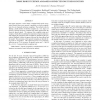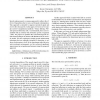417 search results - page 6 / 84 » Signal processing tools for speech recognition |
114
click to vote
ICASSP
2009
IEEE
15 years 9 months ago
2009
IEEE
In recognizing spontaneous speech, the performance of typical speech recognizers tends to be degraded by filled and silent pauses, which are hesitation phenomena frequently occur...
106
Voted
ICASSP
2010
IEEE
15 years 2 months ago
2010
IEEE
This paper proposes a noise robust exemplar-based speech recognition system where noisy speech is modeled as a linear combination of a set of speech and noise exemplars. The metho...
117
Voted
TSD
2005
Springer
15 years 8 months ago
2005
Springer
Although speech, derived from reading texts, and similar types of speech, e.g. that from reading newspapers or that from news broadcast, can be recognized with high accuracy, recog...
115
Voted
ICASSP
2010
IEEE
15 years 3 months ago
2010
IEEE
Speech enhancement is a common approach to address the effects of degradation due to noise and channel contamination. This approach is intended to suppress unwanted signal and rec...
128
click to vote
ICASSP
2009
IEEE
15 years 9 months ago
2009
IEEE
This paper describes a way of designing modulation filter by datadriven analysis which improves the performance of automatic speech recognition systems that operate in real envir...


